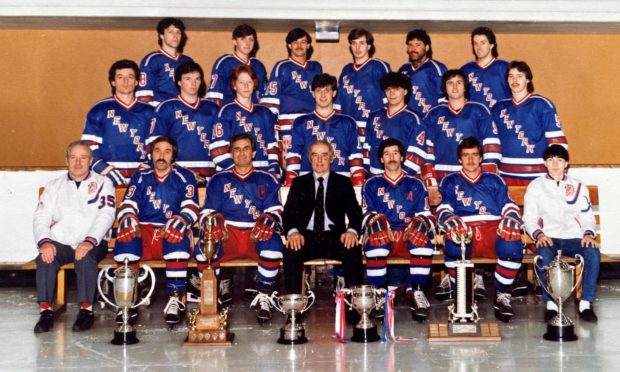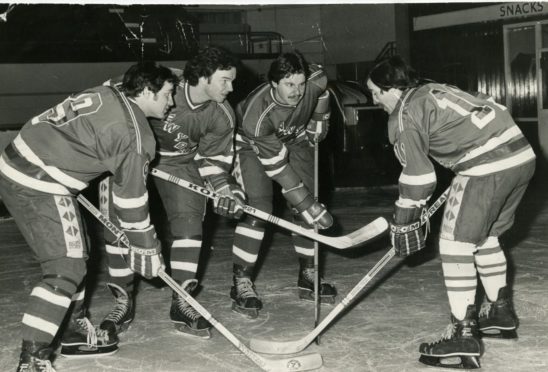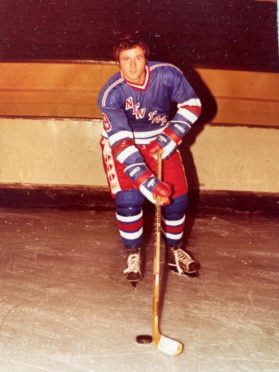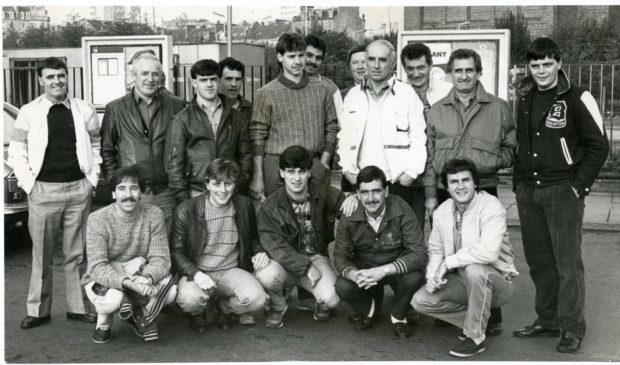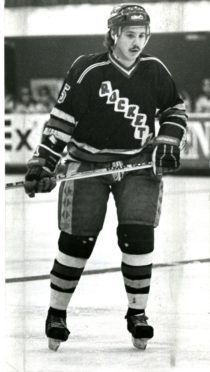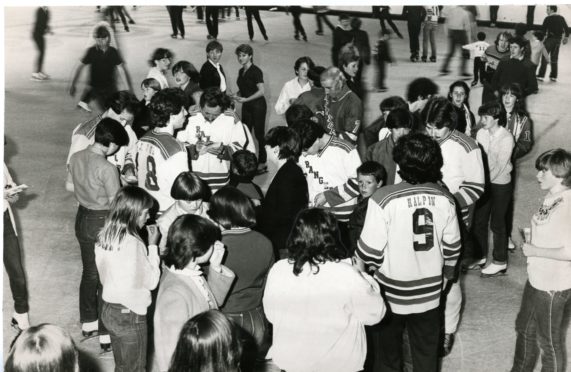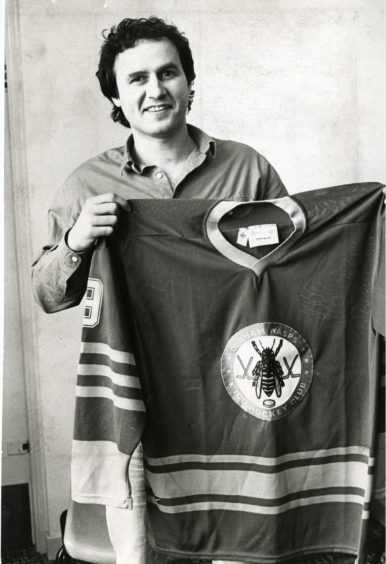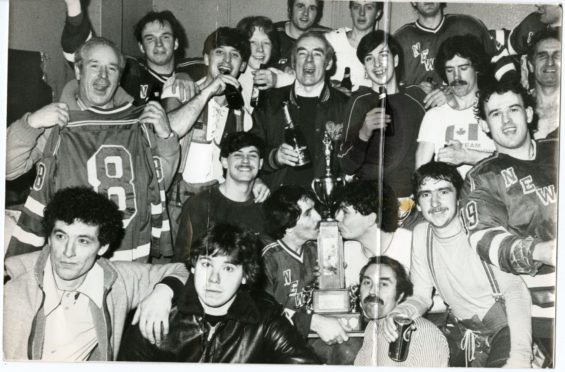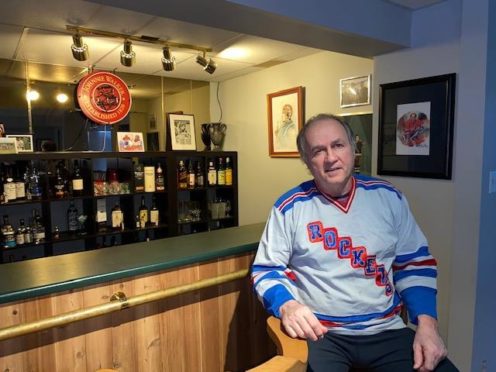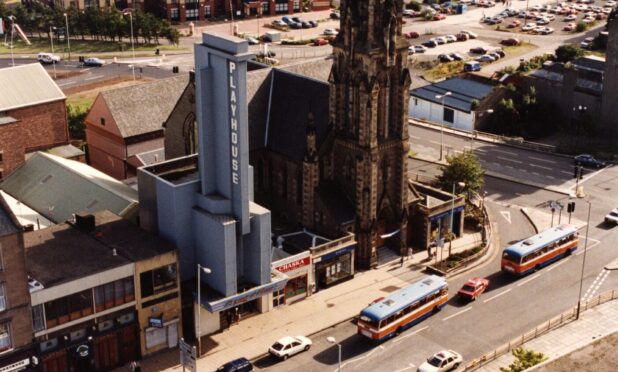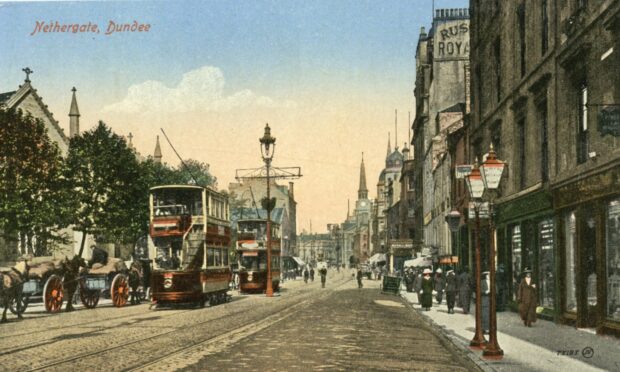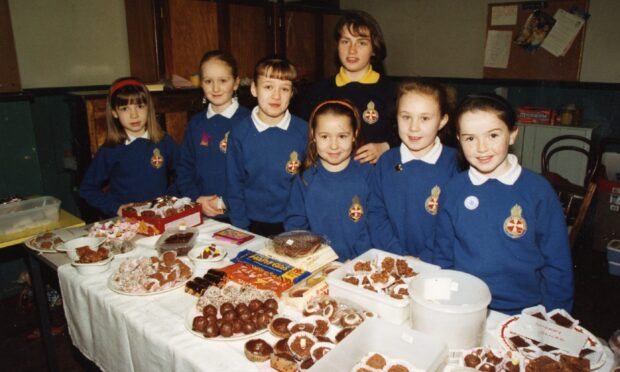Roy Halpin is the ice hockey hero and record-breaker from Canada whose time in Dundee is still etched in his heart.
Roy signed for Dundee Rockets 40 years ago and was the holder of the British senior record for a season with 151 goals and 254 points in 48 games in 1981-82.
He made the Guinness Book of Records for the most goals in one British League game which was 14 against Durham Wasps in a Spring Cup semi-final in 1982.
Roy scored over 400 goals and 350 assists and led the Rockets to three Grand Slams as Tom Stewart’s team became a dynasty in the 1980s.
The winger was inducted in the British Hockey Hall of Fame after a back injury forced his retirement from the game in 1985 at the age of 29.
Roy’s man cave tells the story of his time in Dundee
“I can truly say that I am honoured and have been blessed to have spent four years of my life in Dundee,” he said.
“Effectively, hockey introduced me to Dundee but, more importantly, its people introduced me to a sense of cultural belonging that I could not have ever imagined.
“In fact, my home now offers a man cave enshrining my Dundee days.
“If not my snooker table and dart board, or my bar offering over 40 malts, it is the multitude of pictures and memorabilia that tells the story of my time and friends that are etched in my heart.
“Even to this day, following my retirement from hockey, I don’t visit Dundee, I go home to Dundee.”
Born in Quebec in 1955, Roy started to play competitive hockey aged seven and his mother paid him $1 for every goal or assist he earned on the scoresheet.
“I had the luck of playing on great teams throughout my youth hockey,” he said.
“Winning breeds winning, and, in any player development, this is a huge motivational advantage.
“You learn from a young age that heart and team are the generators behind success on ice.
“I believe I applied this principle reasonably well throughout my career.”
Record-breaker once scored three goals in 16 seconds
Roy moved on to university hockey and spent three years at the University of Moncton as an undergraduate and played for the Blue Eagles where he earned his first Guinness Book of Records entry by scoring three goals in just 16 seconds.
Receiving an offer from the NHL’s Toronto Maple Leafs in 1979, he opted instead to go to Concordia University to earn a graduate degree in sports administration.
Roy played for the university team which set him on the road to Dundee.
Roy first came to the city in 1980 with the Concordia Stingers for an international tournament which was organised by Tom Stewart.
“We won the event, I managed to finish top scorer, and, more importantly, made friends, who a year later extended an invite for me to play for the Rockets,” said Roy.
“I was playing in Japan at the time and had recently returned from Sapporo when Tom gave me a call.
“That August saw me on a plane to Dundee.
“Other than that tournament in 1980, I had only previously heard about Dundee as a result of my grandfather who forever had been putting marmalade on my bread as I sat atop my baby chair.”
The team was made up of British players with an additional three import players who were on full-time contracts.
Halpin arrived from Concordia Stingers
Halpin was at the top of Stewart’s list along with Chris Brinster and Kevin O’Neill who also played for Concordia Stingers in the tournament in 1980.
Roy said: “You have to look past the foreign players to understand why we were more consistent.
“We had one of the best goalies in the league with Mike Ward; two of Britain’s best in brothers Ronnie and Ally Wood; a runaway train in Jock McGuff; the leadership and calm of George Reid; a skating machine in Charlie Kinmond; and the talent and tenacity of Jimmy Pennycook.
“Combine these with the heart and soul of other team-mates and you have a recipe for consistency that translated into wins, into championships, into Grand Slams and onto becoming a dynasty.
“At the time, I don’t believe winning Grand Slams was part of our day-to-day approach to winning games.
“As an import, most kids in Canada fantasize on winning the Stanley Cup.
“The fact that Grand Slams were major achievements was never part of our strategy or discussion in the dressing room.
“Winning led to believing and solidified confidence.
“This was our DNA and the hardware was simply an end result of that.
“From the onset, the Rockets stepped onto the ice in every game believing we would win.
“To be the best, you must measure yourself against the best. We were up to this challenge on many nights.
“As time passes into years, only then do you understand the achievements we captured.
“Today, for I as well as my team-mates, the Grand Slams are simply an identity to grab and gauge the scope and impact of our successes.
“These successes are the bond that, still today, holds us as one.”
Rockets were wanted by the Dutch police after prank
Roy spent 157 minutes in the cooler during his time with the Rockets although a fire extinguisher prank in Holland landed him in hot water with the Dutch police!
We were playing in a tournament in Den Haag in Holland and Chris, Allard Leblanc and I decided to extend our night out well past a reasonable hour,” he said.
“This was probably the only time this happened during my four years in Dundee!
“Regardless, when we got back to our hotel room at 3am, not one piece of furniture or decor was in the room.
“Our team-mates had jumped balconies and emptied the room.
“As vengeance, an individual – whose name I will hold confidential to my grave – grabbed the chemical powder fire extinguisher on the wall to counter-attack this atrocity.
“In five seconds, the whole floor was inundated with white powder floating around and seeping into every room.
“From there, I only remember making my way down the elevator to the lobby and seeing the night manager’s face when a cloud of smoke followed us out the front door to the beach where we slept overnight.
“Last I heard the police were looking for us at the airport to offer us a sleeping option at the local jail.
“We were already half way to Dundee by then!”
Farewell to a Dundee Rockets legend
Roy suffered a back injury in a game against Murrayfield Racers before scoring his 100th point of the season in the final game in his career against Nottingham.
“The fact an injury dictated my transition to retirement, I am of the opinion that it was easier to move away from the game I loved,” he said.
“A few months later I tested my return in Nottingham and accepted an end to my playing days.
“Ultimately, there was no dwelling about has the time come?
“It was obvious I had to move on to a second career.”
A testimonial match was organised by the Rockets following Roy’s retirement where he was overcome with emotion after being asked to address his legions of fans.
“All of my life until that magic moment, I had full control of my emotions in every situation I had ever faced,” he said.
“My sense of control over my emotions abandoned me at that moment and my heart began to speak.
“My words were not about the hockey but much more so about the gentlemen on the ice and the fans in the stands.
“How can words describe the realisation that my most treasured moment in hockey was all about a thank you and I love you to all who had supported me during my time in Dundee?
“In essence, I have never left Dundee behind.
“Home is always where your family and friends are and alongside the realisation that Dundee adopted a massive part of my heart, I have and will always carry this privilege as an inspiration to my personal pathway in life.”
The demise of the Rockets happened just as quickly as success on the ice and by 1989 top-class hockey came to an end in Dundee.
‘Dundee has always had hockey in its genes’
The ‘old rink’ was demolished for a Tesco site in 1990 before the sport returned following the opening of Dundee Ice Arena at Camperdown Leisure Park in 2000 at a cost of £6.6 million.
“To be honest, the demise was not at all surprising,” said Roy.
“Most times in hockey when a new kid on the block arrives in any sport, in any league, in any country, it takes a huge amount of energy, passion and financial oomph.
“Combine this with an above average winning team as we had, the game and expectations begin to overwhelm the organisation in financial terms.
“The recycling of hockey in a city is dependent on whether the heart and soul of hockey history is entrenched enough to regenerate enthusiasm and continue to face the hurdled pathway to long-term success of a sport and team.
“Dundee has always had hockey in its genes.
“It is destined to achieve a more consistent and long-term cycle if it hasn’t already.
“I have no doubt that Dundee is well equipped to be a locomotive for the sport for many years.”
Roy was hired by Tennis Canada in early 1986 following his retiral to organise an annual professional tennis tournament in Montreal.
The Rogers Cup remains one of the biggest events on the world stage and Roy went on to hold management positions with the PGA Tour and Boxing Canada.
He is currently the executive director for amateur and Olympic boxing in Canada and plans to retire following the 2024 Paris summer games.
Roy has been married 20 years to Martine Chartrand and has a 19-year old daughter, Gabrielle, and 17-year son, Liam, who is also a promising hockey player.
Roy plans to return ‘home’ to Dundee in 2022
Roy regularly returns to Dundee to meet up with his former team-mates although the global pandemic means the Halpin family’s next visit will likely be in 2022.
Roy said: “Winning teams always find a way to bond as individuals and not just as players.
“Memories and friendships remain timeless.
“On every passage to Dundee, we have get-togethers and reignite the experiences and storytelling that years have grossly enhanced.
“The respect and love that emerged from our common expectations on and off the ice have been pillars of all our day-to-day lives.”
